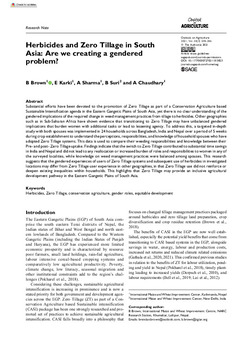Mostrar el registro sencillo del ítem
Herbicides and zero tillage in South Asia: are we creating a gendered problem?
| Creador: | Brown, B. |
| Creador: | Karki, E.S. |
| Creador: | Sharma, A. |
| Creador: | Suri, B. |
| Creador: | Chaudhary, A. |
| Año: | 2021 |
| URI: | https://hdl.handle.net/10883/21515 |
| Lenguaje: | English |
| Editor: | SAGE Publications |
| Copyright: | CIMMYT manages Intellectual Assets as International Public Goods. The user is free to download, print, store and share this work. In case you want to translate or create any other derivative work and share or distribute such translation/derivative work, please contact CIMMYT-Knowledge-Center@cgiar.org indicating the work you want to use and the kind of use you intend; CIMMYT will contact you with the suitable license for that purpose |
| Tipo: | Article |
| País de enfoque: | South Asia |
| Lugar de publicación: | United Kingdom |
| Páginas: | 238-246 |
| Número: | 3 |
| Volumen: | 50 |
| DOI: | 10.1177/00307270211013823 |
| Palabras Claves: | Gender Roles |
| Palabras Claves: | Equitable Development |
| Descripción: | Substantial efforts have been devoted to the promotion of Zero Tillage as part of a Conservation Agriculture based Sustainable Intensification agenda in the Eastern Gangetic Plains of South Asia, yet there is no clear understanding of the gendered implications of the required change in weed management practices from tillage to herbicides. Other geographies such as in Sub-Saharan Africa have shown evidence that transitioning to Zero Tillage may have unbalanced gendered implications that burden women with additional tasks or lead to lessening agency. To address this, a targeted in-depth study with both spouses was implemented in 24 households across Bangladesh, India and Nepal over a period of 5 weeks during crop establishment to understand the perceptions, responsibilities, and knowledge of household spouses who have adopted Zero Tillage systems. This data is used to compare their weeding responsibilities and knowledge between their Pre- and post- Zero Tillage uptake. Findings indicate that the switch to Zero Tillage contributed to substantial time savings in India and Nepal and did not lead to any reallocation or increased burden of roles and responsibilities to women in any of the surveyed localities, while knowledge on weed management practices were balanced among spouses. This research suggests that the gendered experiences of users of Zero Tillage systems and subsequent use of herbicides in investigated locations may differ from Zero Tillage user experience in other geographies, in that Zero Tillage use did not reinforce or deepen existing inequalities within households. This highlights that Zero Tillage may provide an inclusive agricultural development pathway in the Eastern Gangetic Plains of South Asia. |
| Agrovoc: | HERBICIDES |
| Agrovoc: | ZERO TILLAGE |
| Agrovoc: | CONSERVATION AGRICULTURE |
| Agrovoc: | GENDER |
| Agrovoc: | EQUITY |
| ISSN: | 00307270 |
| Revista: | Outlook on Agriculture |
Ficheros en el ítem
Este ítem aparece en la(s) siguiente(s) colección(ones)
-
Socioeconomics
Including topics such as farming systems, markets, impact & targeting, innovations, and GIS

